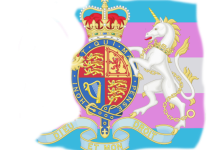By Dr Julia Long
If you can’t change your sex, why are the terms ‘transsexual’ and ‘transwoman’ lent credence among British gender critical feminists?
Jennifer Bilek’s important recent article on ‘good transwomen’ has initiated a long-overdue conversation about the role and influence of ‘transsexuals’ within gender critical spaces. In this piece I continue the conversation with a consideration of the inhibiting effects of their presence on critical thinking and language use in the British context.
Language determines what is perceptible, thinkable, possible and knowable within a culture. Language develops to support and enable different ways of thinking, or is suppressed in order to discourage them. The speed and ease with which new terms are established determines how quickly new social realities become normal; ‘social distancing’ and ‘self-isolation’ are obvious current examples. The relationship between the words we use and the lives we live is, to borrow Andrea Dworkin’s phrase, an umbilical one.
This relationship is nowhere more obvious than in the phenomenon of ‘transgenderism,’11. I put the word in inverted commas to draw attention to the fact that the term and all its associated concepts are fictitious, based as they are on premises that do not stand up to scrutiny. The term ‘transgenderism’ only makes sense if it is used to refer to an ideology, with its proponents as ‘transgenderists’. However, it is seldom used in this way: instead, the term is persistently used both by its proponents and critics alike to refer to a state of being – that someone can somehow be ‘transgender’. which has over the past decade or so introduced a dizzying and seemingly endless proliferation of patently absurd new terms and concepts: ‘gender identity’, ‘trans woman’, ‘non-binary’. Given that these terms are based on false premises and easily exposed as fictitious, it is strange that the British gender critical22. I use this term here to refer to those groups and individuals who claim to be in favour of both women’s rights and ‘trans rights’. I do not include myself within this grouping as I neither accept the fiction of transgenderism nor the ‘right’ of an individual to be treated according to this fiction.movement has shown very little willingness to reject wholesale the pernicious language of transgenderism. High-profile groups such as A Woman’s Place UK (WPUK) and Fair Play for Women insist that they are in favour of the rights of ‘trans people’, habitually use the terms ‘trans woman’ or ‘transwoman’, and use ‘she’ pronouns for men who demand it. Paradoxically then, much of what is written and spoken in the name of British gender critical feminism in fact does the ideological work of transgenderists for them, promulgating their fictions as legitimate and valid through speaking their language.
The terms ‘transsexual’ and ‘transwoman’ are particularly glaring examples of this. It is striking that while gender critical feminists correctly insist that it is not possible to change sex, many breezily continue to use the term ‘transsexual’ or ‘transwoman’33. The term ‘transwoman’ (rather than ‘trans woman’) is used by men who consider themselves to be ‘transsexual’.as if such a change were possible and as if such individuals exist. This oddly contradictory position is thoroughly normalised – mandated, even – at events held by groups like WPUK and Filia, and in the writings and speeches of media feminists like Julie Bindel and Sarah Ditum and academics such as Kathleen Stock and Selina Todd. Dissenters who point out this contradiction and straightforwardly name so-called ‘transsexuals’ as men are misrepresented and denounced as deliberately provocative, disrespectful and unkind.
So why are the terms ‘transsexual’ and ‘transwoman’ lent credence? One very obvious answer lies in the presence of such men within the gender critical movement, which predictably has had a chilling effect on women’s ability or willingness to speak plainly. In 2018, two men, Kristina Jayne Harrison and Debbie Hayton, spoke at a third of all WPUK events between them. Billed and introduced as ‘transwomen’, their speeches were greeted with great enthusiasm, often surpassing the reception given to female speakers. Harrison’s talk at a WPUK meeting in Hastings remains the second most popular of all the talks on the WPUK YouTube channel, with an astounding 23,000 views (most of the talks garner around two or three thousand views).
Hayton and Harrison both have a history of championing the ‘rights’ of men who claim to be women to be treated as such and to intrude into women’s spaces. A teacher and trade unionist, Hayton contributed to guidance on Trans Equality in Schools and Colleges which states that ‘Trans teachers should be free to use toilets appropriate to their acquired gender’. A self-confessed autogynephile, he supports access to ‘gender reassignment’ and has called for the ‘de-stigmatisation’ of his paraphilia. Watching Hayton’s wife talk about the impact of his decisions on herself and their children makes for very uncomfortable viewing. It is strange, given their name and declared mission ‘to ensure women’s voices would be heard’, that WPUK chose to offer regular speaking opportunities to men who put their wives into this position, rather than to the women themselves (a woman’s place is staying at home while her ‘transwoman’ husband holds forth at women’s meetings?).
Harrison has a history of playing in women’s football teams, of claiming that he has ‘lived, worked and been treated as a woman for 20 years’ and stating that he is ‘married to an avowed lesbian’, none of which seems to have adversely affected the cosy relationship he enjoys with WPUK organisers or defender of women’s rights and lesbian rights Julie Bindel:


Harrison and Hayton ingratiate themselves at WPUK meetings through linguistic manoeuvres which involve making claims to their legitimate and customary accommodation within the social group ‘women’ whilst simultaneously acknowledging that they are male. This combination appears to entirely bamboozle WPUK audiences, causing them to lose their critical faculties and instead endorse the men’s utterances with rapturous applause and approving – if nonsensical – comments: ‘Kristina knows she’s male!’ ‘Kristina acknowledges that sex is different to gender and that she is a transwoman’.
The revered status of Harrison and Hayton is achieved through their success in convincing audiences that they are ‘transwomen’, and they do this through repeatedly invoking a mysterious-sounding process they have apparently undergone, which they refer to as a ‘meaningful transition’. The term has the ring of a Restoration comedy about it (and would no doubt lend itself to such a treatment – A Meaningful Transition, A Comedie by Mister Harrison, as it is Acted Tonight by the Companie of the Women’s Place UK) but nonetheless is deployed very effectively by its proponents to persuade women that certain men do not belong in the category of ‘men’. The term appears in Harrison’s talk in Hastings:
[Transsexual] is a term that describes people who for the most part undergo or wish to undergo a gender reassignment surgery and have hormone treatment to complete what I would describe as a meaningful medical transition
Harrison’s Talk in Hastings
… in Hayton’s talk at a WPUK meeting in Liverpool:
[The word transsexual] ” implies somebody who has made or intends to make a meaningful transition that has been driven by gender dysphoria “
Hayton’s talk at a WPUK Meeting In Liverpool
… and here – perhaps surprisingly to some – in a Spectator article by Julie Bindel:
I am polite and courteous, and use female pronouns when addressing those who have meaningfully transitioned“
Julie Bindel
This concept of a ‘meaningful transition’ apparently refers to surgical and medical interventions such as castration, the construction of faux female genitalia, breast implants and hormone regimes. Yet given the repeated acknowledgement that it is impossible to change sex, the claims of these men that the mutilation of or hormonal influences on their bodies result in a ‘transition’ are hardly convincing. What is clear, however, is what they wish such a claim to achieve. According to Kristina Harrison, this ‘meaningful transition’:
not only helps us to fit into an opposite sex social reality… but also goes some way to putting many women at greater ease at having male-born people in their spaces.
Kristina Harrison
Let that sink in. ‘Putting women at ease at having male-born people in their spaces’. Here is a man speaking to a group of women supposedly committed to protecting women’s single-sex spaces, making his ambition to access those spaces abundantly clear, and being rewarded with fulsome praise and applause.
And here is Hayton:
For years transsexuals have been quietly included by women, either as a right if we have a GRC or by consent in many cases: in my own, where there is no GRC. And in real life women do include me in their spaces because they say they want me to be there“
Debbie Hayton
Again, let that sink in. ‘Women do include me in their spaces because they say they want me to be there’. As with Harrison’s comment above, this statement was made plainly from the platform of a group supposedly committed to preserving women’s single-sex spaces, without a murmur of dissent from the audience.
What is clear is that the phrase ‘a meaningful transition’ functions rhetorically as an extraordinarily successful device wielded by Harrison and Hayton, and their allies such as WPUK and Bindel, to persuade women to accept that these men are ‘transwomen’. They would have us believe that their insulting attempts to appropriate the female body through socially-sanctioned mutilation should act as a passport to gain access to women’s social spaces and community.
It’s worth taking a moment to reflect that Hayton and Harrison’s category of men who ‘have undergone or intend to undergo a meaningful transition’ includes transgenderists such as John Ozimek / Jane Fae, Munroe Bergdorf, Warren / Heather Peto, Paris Lees, Shon Faye, Frank / Kellie Maloney, Sarah Brown, Mark Hellen / Natascha Kennedy, Liam / Lily Madigan and convicted murderer Peter Laing / Paris Green. Hayton and Harrison’s interest in preventing reforms that would bring in gender self-identification is primarily one of gate-keeping; they fear that ‘transsexuals’ such as themselves may lose access to women’s spaces through a potential backlash against the expansion of the category ‘woman’ to include those men who, unlike them, had not been through this ‘meaningful transition’.
Interestingly, Hayton and Harrison did not feature on WPUK panels in 2019, which were far fewer in number than their 2018 meetings. But by this point their influence was well-established, and the effect of their presence evident. This took a particularly dark turn in early 2019 when Harrison publicly participated in the very serious smearing and misrepresentation of British women – myself included – who had gone to the US to support feminists there in raising awareness of and lobbying against proposed legislative reforms which would have disastrous consequences for women and children.

Harrison’s attempt to construct a narrative around legitimate / illegitimate voices (based on scurrilous misrepresentation and falsehoods) in what is primarily a movement of women and women’s groups reveals an extraordinary level of male entitlement and arrogance. I do not wish to reproduce any more of his commentary, which quickly descends into the realm of defamation, but what is even more extraordinary is the enthusiastic endorsement his pronouncements received from commentators more usually associated with women’s rights and lesbian rights.
What is sobering but necessary to remember is that these men would have had little influence had their voices not been amplified by WPUK and its associates. It is difficult to imagine such men being entertained for a moment within the Women’s Liberation Movement of the 1970s and 80s, so it is particularly ironic that the recent WPUK conference was titled Women’s Liberation 2020.
It is important to remember though that groups and individuals such as the Lesbian Rights Alliance, Standing for Women, Sheila Jeffreys, myself and many women active on social media have not allowed the pretensions of men to dull our perception of reality. Familiar as we are with those other male-authored dramas A Duplicitous Assertion and The Preposterous Postulation, we are perhaps less receptive to the long-running performance of A Meaningful Transition.
Thanks to Natasha Read and Kellie-Jay Keen-Minshull for sourcing a number of the references in this article.
- I put the word in inverted commas to draw attention to the fact that the term and all its associated concepts are fictitious, based as they are on premises that do not stand up to scrutiny. The term ‘transgenderism’ only makes sense if it is used to refer to an ideology, with its proponents as ‘transgenderists’. However, it is seldom used in this way: instead, the term is persistently used both by its proponents and critics alike to refer to a state of being – that someone can somehow be ‘transgender’.
- I use this term here to refer to those groups and individuals who claim to be in favour of both women’s rights and ‘trans rights’. I do not include myself within this grouping as I neither accept the fiction of transgenderism nor the ‘right’ of an individual to be treated according to this fiction.
- The term ‘transwoman’ (rather than ‘trans woman’) is used by men who consider themselves to be ‘transsexual’.



